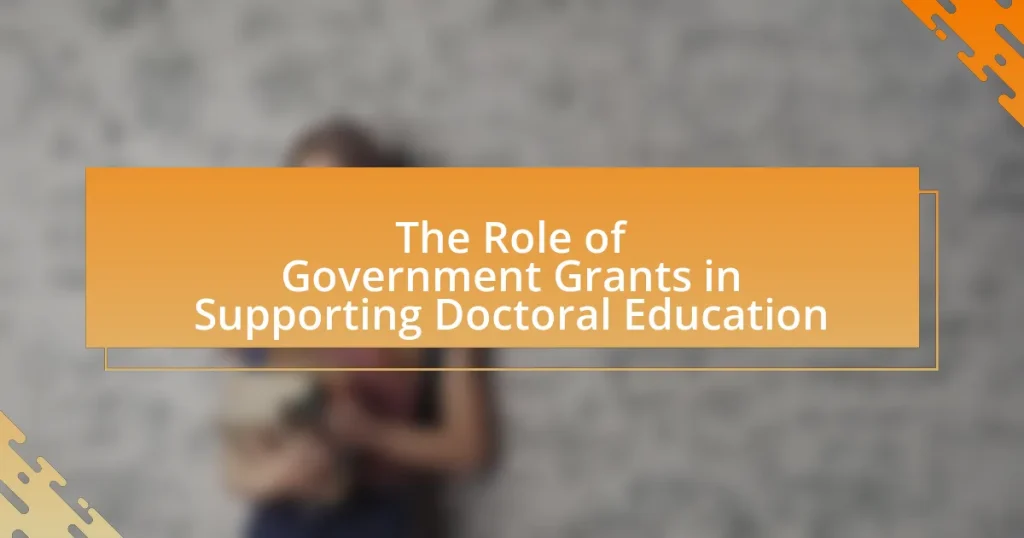Government grants play a crucial role in supporting doctoral education by providing financial assistance that alleviates the burden of tuition, living expenses, and research costs for students. These grants, offered by entities such as the National Science Foundation and the National Institutes of Health, enhance access to advanced education, promote diversity, and foster innovation in critical fields. The article outlines the various types of government grants available, eligibility criteria, the application process, and the significant impact these grants have on student enrollment, research quality, and overall educational outcomes. Additionally, it highlights best practices for applicants seeking funding and the long-term benefits that government grants provide to doctoral graduates.

What are Government Grants and Their Purpose in Doctoral Education?
Government grants are financial awards provided by government entities to support various educational initiatives, including doctoral education. Their primary purpose is to alleviate the financial burden on students and institutions, enabling research and academic pursuits that contribute to knowledge advancement. For instance, in the United States, the National Science Foundation and the National Institutes of Health offer grants specifically aimed at funding doctoral research projects, which fosters innovation and supports the development of skilled professionals in critical fields. These grants often cover tuition, living expenses, and research costs, thereby enhancing access to advanced education and promoting diversity within doctoral programs.
How do government grants function in the context of doctoral education?
Government grants function in the context of doctoral education by providing financial support to students pursuing advanced degrees, thereby reducing their financial burden and enabling them to focus on research and academic work. These grants are typically awarded based on merit, need, or specific research proposals, and they can cover tuition fees, living expenses, and research costs. For instance, the National Science Foundation offers grants that support doctoral students in STEM fields, which helps to foster innovation and research development in critical areas. By alleviating financial constraints, government grants play a crucial role in increasing access to doctoral education and promoting a diverse academic environment.
What types of government grants are available for doctoral students?
Federal government grants available for doctoral students include the National Science Foundation Graduate Research Fellowship Program, the National Institutes of Health Ruth L. Kirschstein National Research Service Award, and the U.S. Department of Education’s Graduate Assistance in Areas of National Need program. These grants provide financial support for research, tuition, and living expenses, enabling students to focus on their studies and contribute to their fields. For instance, the National Science Foundation program awards approximately $34,000 annually to selected fellows, supporting their research endeavors and professional development.
How are government grants allocated to educational institutions?
Government grants are allocated to educational institutions through a structured process that typically involves federal and state agencies assessing funding applications based on specific criteria. These criteria often include the institution’s educational objectives, the proposed use of funds, and the potential impact on student outcomes. For instance, the U.S. Department of Education allocates grants through competitive processes, where institutions submit proposals that are reviewed by panels of experts who evaluate the merit and feasibility of the projects. In the fiscal year 2021, the U.S. government allocated approximately $150 billion in federal grants to support various educational initiatives, demonstrating the significant financial commitment to enhancing educational opportunities.
Why are government grants important for doctoral education?
Government grants are crucial for doctoral education because they provide essential funding that supports research, tuition, and living expenses for students. This financial assistance enables scholars to focus on their studies and research without the burden of excessive debt. According to the National Science Foundation, government grants accounted for approximately 60% of federal funding for academic research in 2020, highlighting their significant role in advancing knowledge and innovation. Additionally, these grants often promote interdisciplinary collaboration and enhance the quality of education by allowing institutions to invest in resources and facilities that benefit doctoral candidates.
What impact do government grants have on student enrollment in doctoral programs?
Government grants significantly increase student enrollment in doctoral programs by alleviating financial barriers. Research indicates that access to funding through government grants allows more students to pursue advanced degrees, as it reduces the burden of tuition and living expenses. For instance, a study by the National Science Foundation found that institutions with substantial federal grant funding reported higher enrollment rates in doctoral programs, particularly among underrepresented groups. This correlation demonstrates that government grants play a crucial role in expanding access to doctoral education, thereby enhancing diversity and fostering a more educated workforce.
How do government grants influence the quality of doctoral education?
Government grants significantly enhance the quality of doctoral education by providing essential funding for research, resources, and faculty support. These grants enable institutions to invest in advanced research facilities, hire qualified faculty, and offer competitive stipends to doctoral students, which collectively contribute to a more robust educational environment. For instance, the National Science Foundation (NSF) allocates millions annually to support doctoral programs, resulting in increased research output and improved academic standards. This financial support allows universities to attract top talent and foster innovative research, ultimately elevating the overall quality of doctoral education.

What are the Eligibility Criteria for Government Grants in Doctoral Education?
Eligibility criteria for government grants in doctoral education typically include being enrolled in an accredited doctoral program, demonstrating financial need, maintaining a minimum GPA, and being a citizen or permanent resident of the country offering the grant. These criteria ensure that the funding supports qualified candidates who are committed to advancing their education and research. For instance, the National Science Foundation (NSF) in the United States requires applicants to be enrolled in a PhD program and to have a strong academic record, which is a common standard among various government grant programs.
Who qualifies for government grants in doctoral programs?
Individuals who are enrolled in accredited doctoral programs at recognized institutions typically qualify for government grants. Eligibility often extends to U.S. citizens or permanent residents who demonstrate financial need, as assessed through the Free Application for Federal Student Aid (FAFSA). Additionally, specific grants may target underrepresented groups, such as minorities or individuals pursuing research in high-demand fields. For instance, the National Science Foundation offers grants aimed at supporting doctoral students in STEM disciplines, reinforcing the commitment to diversify the academic landscape.
What academic requirements must be met to receive government grants?
To receive government grants, applicants typically must be enrolled in an accredited educational institution and maintain a minimum GPA, often around 2.5 to 3.0 on a 4.0 scale. Additionally, applicants may need to demonstrate satisfactory academic progress, which includes completing a certain number of credit hours each academic year. These requirements ensure that grant recipients are committed to their educational pursuits and are making adequate progress toward their degrees.
Are there specific fields of study that are prioritized for funding?
Yes, specific fields of study are prioritized for funding, particularly in areas deemed critical for national interest and economic growth. For instance, STEM (Science, Technology, Engineering, and Mathematics) fields often receive significant government grants due to their importance in innovation and competitiveness. According to the National Science Foundation, in 2020, over 70% of federal research funding was allocated to STEM disciplines. Additionally, fields such as healthcare, renewable energy, and education are also frequently prioritized, reflecting societal needs and policy goals.
How do applicants navigate the grant application process?
Applicants navigate the grant application process by thoroughly researching funding opportunities, understanding eligibility criteria, and preparing comprehensive proposals. They begin by identifying grants that align with their research goals and academic needs, often utilizing databases and resources provided by government agencies. Once suitable grants are found, applicants carefully review the guidelines to ensure compliance with requirements, which may include specific formats, deadlines, and documentation.
Next, they develop a detailed project proposal that outlines their research objectives, methodology, and budget, ensuring that it clearly addresses the priorities of the funding agency. Many applicants seek feedback from mentors or colleagues to strengthen their proposals. Finally, they submit their applications through the designated channels, often using online portals, and may follow up to confirm receipt and inquire about the review timeline. This structured approach increases their chances of securing funding, as evidenced by studies showing that well-prepared applications significantly improve success rates in grant competitions.
What steps are involved in applying for government grants?
To apply for government grants, individuals must follow a series of structured steps. First, they should identify suitable grant opportunities by researching federal, state, and local government websites that list available grants. Next, applicants need to review the eligibility criteria and guidelines for each grant to ensure they qualify. After identifying a suitable grant, the applicant must prepare a detailed proposal that outlines the project, objectives, budget, and expected outcomes. This proposal often requires supporting documents, such as letters of recommendation or proof of previous work. Once the proposal is complete, applicants submit it through the designated application portal or by mail, adhering to submission deadlines. Finally, after submission, applicants may need to follow up or provide additional information if requested by the grant agency. These steps are essential for successfully navigating the government grant application process.
What common challenges do applicants face during the application process?
Applicants commonly face challenges such as navigating complex application requirements, meeting strict deadlines, and demonstrating eligibility for funding. These hurdles can lead to confusion and frustration, as many applicants may not fully understand the specific criteria or documentation needed to qualify for government grants. Research indicates that approximately 30% of applicants report difficulties in gathering necessary materials, while 25% struggle with the clarity of guidelines provided by funding agencies. Additionally, competition for limited funding can further complicate the process, as applicants must effectively showcase their research proposals to stand out among numerous submissions.

What are the Impacts of Government Grants on Doctoral Education Outcomes?
Government grants significantly enhance doctoral education outcomes by providing essential financial support that enables students to focus on their research and studies. These grants alleviate the financial burden associated with tuition, living expenses, and research costs, allowing doctoral candidates to dedicate more time to their academic pursuits. Research indicates that institutions receiving government funding often report higher completion rates and improved quality of research output. For instance, a study by the National Science Foundation found that doctoral programs with substantial government grant support had completion rates exceeding 80%, compared to lower rates in programs with limited funding. This correlation underscores the critical role of government grants in fostering successful doctoral education.
How do government grants affect the financial burden on doctoral students?
Government grants significantly reduce the financial burden on doctoral students by providing essential funding that covers tuition, research expenses, and living costs. These grants alleviate the need for students to rely solely on personal savings or loans, which can lead to substantial debt. For instance, a study by the National Science Foundation found that students receiving federal grants reported lower levels of financial stress and were more likely to complete their programs on time compared to those without such support. This financial assistance not only enhances academic performance but also promotes greater access to higher education for diverse populations.
What role do government grants play in reducing student debt?
Government grants significantly reduce student debt by providing financial assistance that does not require repayment. These grants, such as Pell Grants in the United States, directly lower the cost of education, allowing students to finance their studies without relying heavily on loans. For instance, in the 2020-2021 academic year, approximately 6.7 million students received Pell Grants, which averaged around $4,000 per recipient, thereby decreasing the amount they needed to borrow. This financial support helps to alleviate the overall burden of student debt, which in the U.S. exceeded $1.7 trillion in 2021. By covering tuition and related expenses, government grants play a crucial role in making higher education more accessible and affordable, ultimately contributing to lower debt levels among graduates.
How do grants influence students’ ability to focus on research and studies?
Grants significantly enhance students’ ability to focus on research and studies by providing financial support that alleviates the burden of tuition and living expenses. This financial relief allows students to dedicate more time and resources to their academic work rather than seeking part-time employment. Research conducted by the National Science Foundation indicates that students receiving grants are more likely to complete their degrees on time and engage in intensive research activities, as they can prioritize their studies without the distraction of financial stress.
What long-term benefits do government grants provide to doctoral graduates?
Government grants provide doctoral graduates with long-term benefits such as reduced financial burden, enhanced research opportunities, and increased career prospects. These grants alleviate the need for student loans, allowing graduates to focus on their research and academic pursuits without the stress of debt. Additionally, funding from government grants often enables access to advanced resources, collaborations, and networking opportunities that can significantly enhance the quality and impact of their research. According to a study by the National Science Foundation, graduates who received government funding reported higher employment rates and better job placements in academia and industry, demonstrating the positive correlation between grant support and career advancement.
How do government grants contribute to career opportunities for graduates?
Government grants significantly enhance career opportunities for graduates by providing financial support for advanced education and research initiatives. This funding enables graduates to pursue doctoral programs without the burden of excessive debt, allowing them to focus on their studies and research. For instance, the National Science Foundation offers grants that support research projects, which can lead to publications and networking opportunities, essential for career advancement in academia and industry. Additionally, government grants often facilitate internships and collaborative projects with industry partners, further enhancing graduates’ employability and practical experience.
What is the relationship between government funding and research innovation?
Government funding significantly enhances research innovation by providing essential financial resources that enable researchers to pursue novel ideas and projects. This funding supports various stages of research, from initial concept development to advanced experimentation, facilitating breakthroughs that might not occur in a purely market-driven environment. For instance, a study by the National Science Foundation found that federal funding accounts for approximately 25% of total research and development expenditures in the United States, underscoring its critical role in fostering innovation. Additionally, government grants often prioritize high-risk, high-reward projects, which can lead to transformative discoveries and advancements in technology and science.
What best practices should applicants follow when seeking government grants?
Applicants seeking government grants should thoroughly research funding opportunities and align their proposals with the specific goals of the grant program. This involves understanding the eligibility criteria, application requirements, and deadlines for each grant. Additionally, applicants should develop a clear and compelling project narrative that outlines the significance of their research, its potential impact, and how it aligns with the funding agency’s priorities.
Furthermore, creating a detailed budget that accurately reflects the project’s needs and justifies expenses is essential. Engaging with mentors or colleagues who have successfully secured grants can provide valuable insights and feedback on the application process. According to the National Science Foundation, successful grant applications often demonstrate a strong alignment with the agency’s mission and include well-defined objectives and measurable outcomes.



